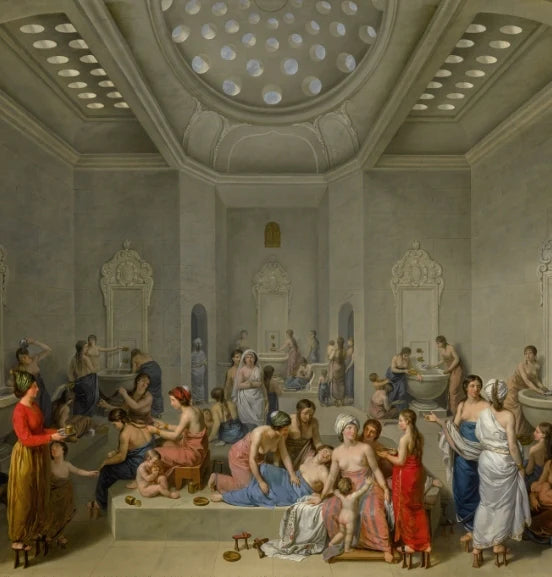

“There must be quite a few things that a hot bath won't cure, but I don't know many of them.”
Sylvia Plath17th Century Anatolia, or present-day Turkey, was replete with fertile soils and hot springs with healing abilities. A spa culture borrowed from the Roman baths developed as the geography of the place endowed its people with natural relaxation spots. A region abundant with superior quality cotton, so much so that the fibers became eponymous with Anatolia! This supreme quality Black Sea cotton attracted the Royals and aristocrats and soon became the gold standard.
While Europeans found comfort in the plushness of these fibers, the women of Turkey found the perfect 'Escape' from the constructs of domestic life, in bathhouses. Graciously clad in nothing but the softest 'peshtemal: a flat woven spa towel' and a bath ritual that transcends well-being, women demonstrated their style through exquisite, ornate textiles.
The history of hammam culture and the geography of Turkey harmoniously came together to make Bursa the birthplace of exquisite towels in the 17th century. A town where every house is an atelier, family heirlooms are trade secrets and where history is woven into each loop and weft.

Unparalleled artistry of the hands found a comrade in century-old wooden looms. These ancient shuttle looms are a testament to the generations of craftsmanship and care. A symbiotic relationship exists between a city’s culture and architecture with its fashion. Southern Turkey boasts of this poetic journey where pragmatic ways of the hammam embodied the skills of the Turkish craftspeople.
As the Ottoman Empire grew, so did the use of towels. The royals, the aristocrats, and the women of the palace commissioned weavers to create elaborate designs for the complete set of hammam towels that included separate pieces for hips, shoulders, and heads. Etisha Collective strives to bring back this romance between women and their beloved custom-made peshtemals by working with generational craftsmpeople, who are keeping this tradition alive.
With only the last few families equipped to run these old looms, one can count on the know-how of each weave looped in these towels. The click and clack of shuttle looms accompanied by a technique so distinctive each weave feels like a palpable musical note.



Once a drab piece of bath accessory, the Turkish towel or the peshtemal became a style statement, thanks to the Ottoman weavers and their carpet weaving skills. A looping technique invented in the 17th century employs an extra warp loop pile beside the warp and weft that lends the towel its longevity and absorbance. Their methods practiced and perfected over time involve choosing best quality fibers and twisting them by hand to create thickness. They apply their know-how of textiles to prevent humidity in a natural way that affects the cotton; using newspaper on the ‘çözgü’ rolls (a large cylindrical beam fixed at the back of a loom) between threads.
Embracing these techniques used around 400 years ago, Etisha Collective employs the artistry of the fringes hanging loosely from the towels' end. This was once the chosen style of the Royal House. It's this attention to detail that produces a one-of-a-kind piece fit for Royals all around the world.
Long threads of fiber provide the softness you want to be wrapped in, and natural dyes harmoniously blend with these fibers to give an exquisite appeal.


Since the early days of cotton cultivation, farmers have kept their lands small and their methods pure. Devoid of chemicals, the cotton that is grown and harvested is truly organic. Sticking to old practises, the farmers today handpick the produce to shape them into beautiful textiles.


Fine turkish cotton fibers are just washed gently with black salt and looped by hand to preserve its long fibers while taming the cotton without chemicals. These preserved long fibers ensure supreme, long lasting absorbency. Even with today’s modern washing machines and dryers, towels made from our got-certified organic cotton will last a minimum of two decades. Our ethos has always been to create simple aesthetics with natural colors, and the intricatehand-tied fringes these little aspects make our pieces seasonless and inherently timeless.
The towels use about 1/2 the amount of water to wash and dry easily, thus working towards sustaining the resources they are derived from.


In a marketplace riddled with not-what-they-seem products, trust is a difficult ideal to nourish; People are made to turn a blind eye to unethical sources and unhealthy materials. But what if you didn’t have to? We understand the importance of transparency and authenticity- hence are developing the best-in-class technology to track our products from farm to fibre, all for you to see.
Through the collaboration with Minespider, we have been awarded a grant to create a DLT based tracking technology as a means to provide transparency on the make, source, and journey of our offerings.
